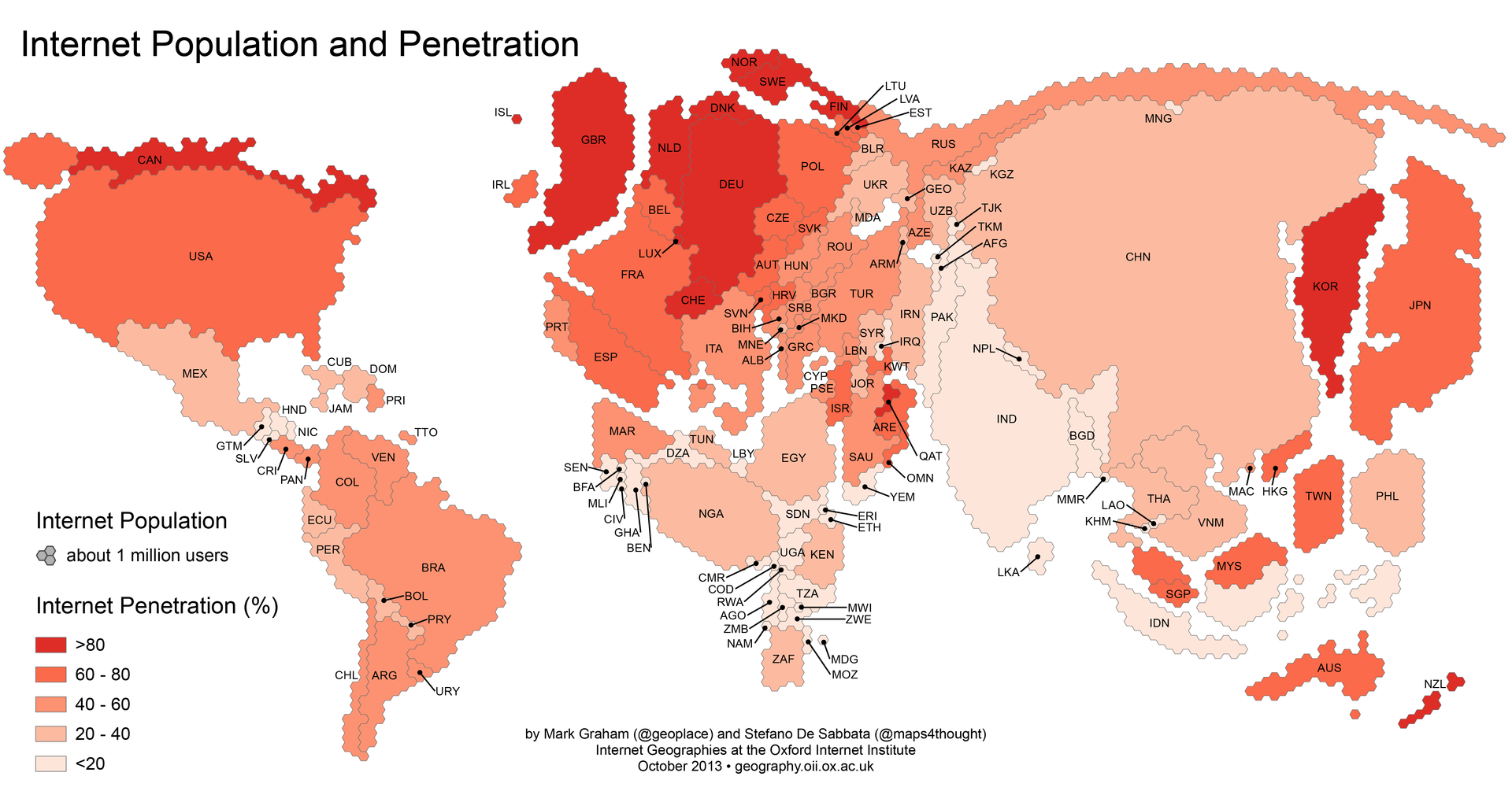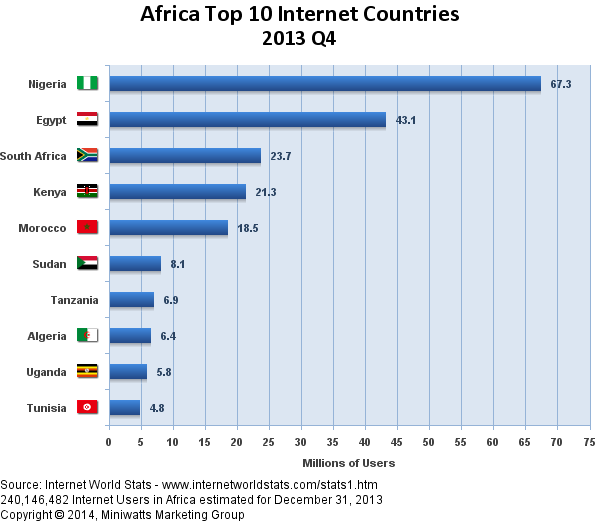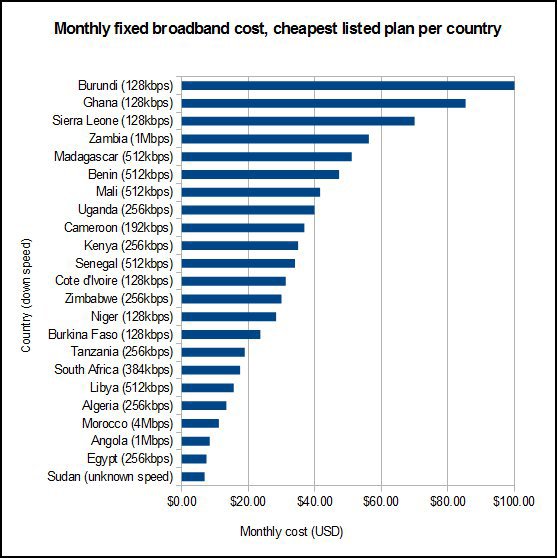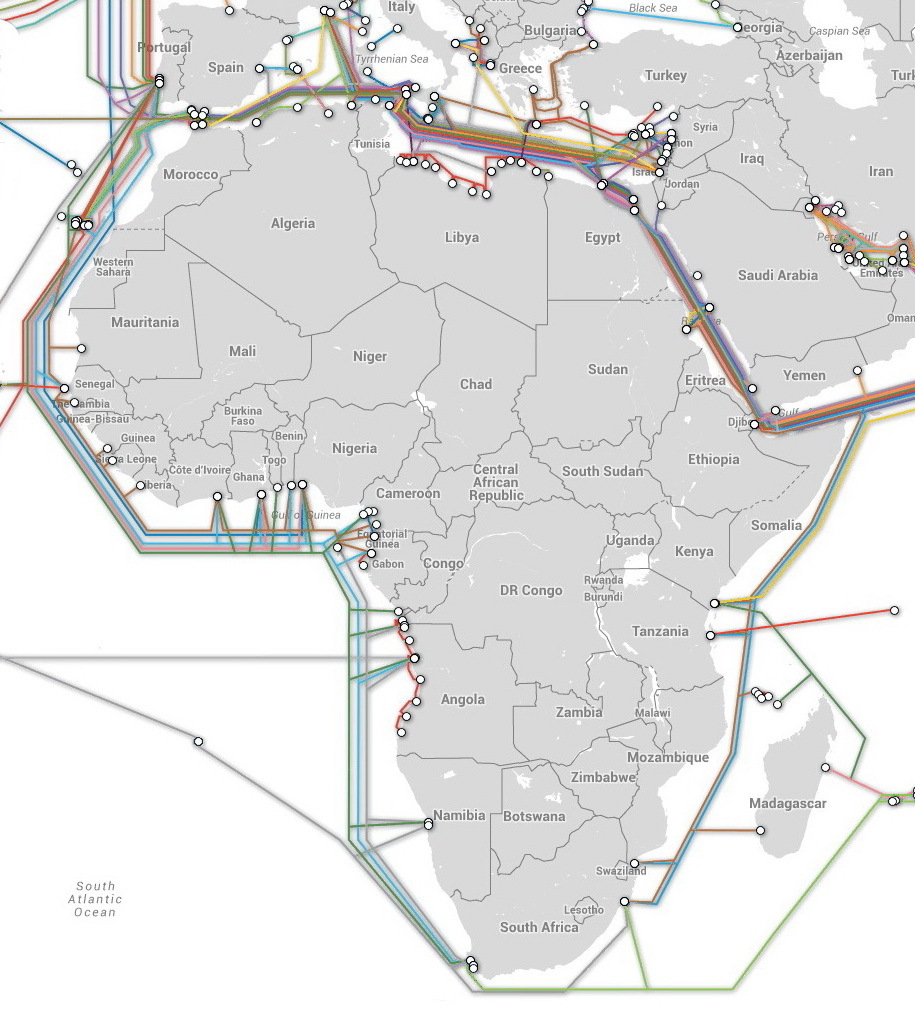Harsh weekdays of the Internet on the African continent
Every day in the world, the need for increasing the capacity of telecommunication channels is growing. Demands for the computing power of data centers are only increasing, ordinary consumers of IT services are quickly getting used to high-quality Internet and simply require providers of minimal network latency even in the most remote corners of the Earth, what can we say about densely populated territories.
The construction of new data centers has become a mundane event. The United States is currently the recognized leader in the total number of data centers, and China, as, in fact, the entire Asian region, has been steadily holding the first place in terms of growth in computing power.
At this time of universal Internet prosperity, there are still a number of countries in the world where there are no major data centers, the number and quality of Internet channels is very limited, and the cost of accessing the network for the average user is sky-high. The reasons for this state of affairs lie in both economic and political motives. Historically, the majority of rogue countries were located precisely on the Black Continent, creating a huge black spot on the map of the entire world IT infrastructure. As things are now, with the Internet in Africa and what are the prospects for its development - this will be discussed further in the article.

At the moment, according to available statistics, Africa with a population of 1.1 billion people is a tiny fraction of the global Internet community. African users make up only about 9% of all users of the worldwide network. This is due to the extremely low percentage of Internet access and its excessive cost in most of the African countries. The distribution of users in Africa is very uneven, which obviously makes the promotion of Internet infrastructure within the whole continent less effective.
According to statistics for 2013, the leader in the total number of Internet users is economically developed Nigeria (67,319,186 users). Further on the list: Egypt (43 065 211 users), South Africa (23 655 690 users), Kenya (21 273 738 users), Morocco (18 472 835 users), other countries have a minimum level of information society. All of these countries are coastal and this has seriously contributed to their superiority over countries within the continent. After all, it was the underwater communications highways that enveloped the coast of Africa that play a decisive role for the region.

The scarcity of existing Internet channels and the high cost of traffic for African people are the main constraining barriers to the development of the IT sector. The small width of the channels, at the level of 10 Tbps, connecting the Black Continent with the world, does not corny fit the needs of the population that are already arising, even despite the frankly low living standards in a predominant number of countries. The price for 1 gigabyte of traffic in the countries of the continent can change dozens of times from $ 10 in developed coastal areas to $ 100 inland. The price level for a connected channel with unlimited traffic can also surprise the openly corrupted by the cheapness of the channels of the inhabitants of the northern latitudes of the planet.

Without capital investments in IT infrastructure, the situation will obviously not change, and since too high prices for Internet services in already poor countries simply do not leave a chance for self-financing of the industry and make deliberately unprofitable investments from the outside, the situation with the informatization of a number of countries looks very depressing.
The main feature of data centers in Africa is their attachment to the coasts. There is simply not enough infrastructure in the continental zone that could support a more or less large data center.

The leader in the number of existing data centers is South Africa. Currently, there are 18 data centers, which makes up more than half of all African data centers. The second country after South Africa in terms of the number of data centers was Egypt, located on the opposite end of the continent, which sheltered 9 units. In countries such as Nigeria, Kenya and Morocco, there are 2 data centers. The total number of data centers located in Africa is 33 units, and this despite the fact that in some developed countries of the world a much more impressive number of data centers are sometimes located. In Paris and its suburbs alone, there are 34 of them. Given the number of existing Internet users with the existing infrastructure, the gap that separates Africans from the rest of the global Internet community becomes apparent.
Over the past 5 years, perhaps, we have seen unbridled progress in access technologies and Internet access itself. A significant role here was played by wireless high-speed Internet technology. Technological progress, although being late, also penetrates the Black Continent. Moreover, wireless Internet is what can revolutionize Africa.

According to recent studies, the volume of mobile Internet traffic in Africa in just one year, from May 2013 to May 2014, increased by 38%. With such a result, Africa outstrips even such a dynamic region as Asia (although only in percentage terms), which makes this result even more impressive. This situation was the result of the fact that Internet users with the recent advent of wireless technology were finally able to access the network without huge investments by local providers in the infrastructure. As a result, the price of such access has become more sane than it was in the case of fixed Internet connections.
The African continent is still on the sidelines of civilization, new technologies penetrate deep extremely slowly. Scattered around the corners of Africa, the centers of the modern world can become platforms for the inevitable development of the region, a region rich in both natural and human resources.
Despite the objectively difficult situation with IT infrastructure, the emerging growth trend in mobile Internet users may perhaps become a watershed for most African countries. By planting as many Africans as possible on the Internet, companies will finally be able to obtain much-needed funds for the development of the continent's still very limited networks. The only thing that exceeds the potential superprofits of companies that can become pioneers in the countries of the continent with a population of more than 1 billion are the risks that they will face there.

The construction of new data centers has become a mundane event. The United States is currently the recognized leader in the total number of data centers, and China, as, in fact, the entire Asian region, has been steadily holding the first place in terms of growth in computing power.
At this time of universal Internet prosperity, there are still a number of countries in the world where there are no major data centers, the number and quality of Internet channels is very limited, and the cost of accessing the network for the average user is sky-high. The reasons for this state of affairs lie in both economic and political motives. Historically, the majority of rogue countries were located precisely on the Black Continent, creating a huge black spot on the map of the entire world IT infrastructure. As things are now, with the Internet in Africa and what are the prospects for its development - this will be discussed further in the article.

At the moment, according to available statistics, Africa with a population of 1.1 billion people is a tiny fraction of the global Internet community. African users make up only about 9% of all users of the worldwide network. This is due to the extremely low percentage of Internet access and its excessive cost in most of the African countries. The distribution of users in Africa is very uneven, which obviously makes the promotion of Internet infrastructure within the whole continent less effective.
According to statistics for 2013, the leader in the total number of Internet users is economically developed Nigeria (67,319,186 users). Further on the list: Egypt (43 065 211 users), South Africa (23 655 690 users), Kenya (21 273 738 users), Morocco (18 472 835 users), other countries have a minimum level of information society. All of these countries are coastal and this has seriously contributed to their superiority over countries within the continent. After all, it was the underwater communications highways that enveloped the coast of Africa that play a decisive role for the region.

The rich get richer, the poor get poorer
The scarcity of existing Internet channels and the high cost of traffic for African people are the main constraining barriers to the development of the IT sector. The small width of the channels, at the level of 10 Tbps, connecting the Black Continent with the world, does not corny fit the needs of the population that are already arising, even despite the frankly low living standards in a predominant number of countries. The price for 1 gigabyte of traffic in the countries of the continent can change dozens of times from $ 10 in developed coastal areas to $ 100 inland. The price level for a connected channel with unlimited traffic can also surprise the openly corrupted by the cheapness of the channels of the inhabitants of the northern latitudes of the planet.

Without capital investments in IT infrastructure, the situation will obviously not change, and since too high prices for Internet services in already poor countries simply do not leave a chance for self-financing of the industry and make deliberately unprofitable investments from the outside, the situation with the informatization of a number of countries looks very depressing.
Specificity of African data centers
The main feature of data centers in Africa is their attachment to the coasts. There is simply not enough infrastructure in the continental zone that could support a more or less large data center.

The leader in the number of existing data centers is South Africa. Currently, there are 18 data centers, which makes up more than half of all African data centers. The second country after South Africa in terms of the number of data centers was Egypt, located on the opposite end of the continent, which sheltered 9 units. In countries such as Nigeria, Kenya and Morocco, there are 2 data centers. The total number of data centers located in Africa is 33 units, and this despite the fact that in some developed countries of the world a much more impressive number of data centers are sometimes located. In Paris and its suburbs alone, there are 34 of them. Given the number of existing Internet users with the existing infrastructure, the gap that separates Africans from the rest of the global Internet community becomes apparent.
Mobile revolution
Over the past 5 years, perhaps, we have seen unbridled progress in access technologies and Internet access itself. A significant role here was played by wireless high-speed Internet technology. Technological progress, although being late, also penetrates the Black Continent. Moreover, wireless Internet is what can revolutionize Africa.

According to recent studies, the volume of mobile Internet traffic in Africa in just one year, from May 2013 to May 2014, increased by 38%. With such a result, Africa outstrips even such a dynamic region as Asia (although only in percentage terms), which makes this result even more impressive. This situation was the result of the fact that Internet users with the recent advent of wireless technology were finally able to access the network without huge investments by local providers in the infrastructure. As a result, the price of such access has become more sane than it was in the case of fixed Internet connections.
African conquista
The African continent is still on the sidelines of civilization, new technologies penetrate deep extremely slowly. Scattered around the corners of Africa, the centers of the modern world can become platforms for the inevitable development of the region, a region rich in both natural and human resources.
Despite the objectively difficult situation with IT infrastructure, the emerging growth trend in mobile Internet users may perhaps become a watershed for most African countries. By planting as many Africans as possible on the Internet, companies will finally be able to obtain much-needed funds for the development of the continent's still very limited networks. The only thing that exceeds the potential superprofits of companies that can become pioneers in the countries of the continent with a population of more than 1 billion are the risks that they will face there.

